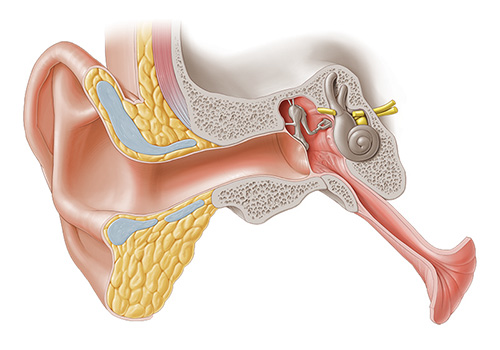Tinnitus is an umbrella term that defines any sound in the ears or head, including ringing, crickets, roaring, buzzing, whooshing, pulsing, etc. Pronounced “tin-a-tus” or “tin-eye-tus,” 2.6 billion people of all ages worldwide experience this subjective phenomenon, making awareness and education on this topic vital.
Causes
Tinnitus is most commonly caused by underlying hearing disorders/diseases of the ear. Some causes of this symptom include:
• Hearing loss of all types and degrees
• Exposure to loud sounds
• Meniere’s disease
• Otosclerosis
• Ear infections
Health issues that can lead to tinnitus and/or hearing loss include:
• Migraines
• Cardiovascular disease
• Certain cardiovascular issues can lead to a pulsing tinnitus sound that corresponds with your heart beat.
• Diabetes
• Temporomandibular joint disorder (TMD)
• Thyroid disorders
• Side effects of certain medications (for example: salicylates, nonsteroidal anti-inflammatory, loop diuretics, and chemotherapy agents)
Contributing Factors
Research shows certain factors can contribute to the loudness or change in the sound in your ear/s.
• Caffeine intake
• Alcohol
• Tobacco
• TMD/grinding teeth/clenchingjaw
• Sodium levels in food
• Stress and muscle tension
• Sleep deprivation
• Sugar substitutes
Treatment
Diagnosing the underlying cause of tinnitus is the first step. It is vital to see a Doctor of Audiology for a comprehensive hearing evaluation and extensive patient history. Based on the many causes, your Doctor of Audiology collaborates with other specialty professionals and doctors in order to provide quality care.
The underlying cause will determine the most appropriate treatment route:
Hearing Aids: sound therapy stimulates the hearing nerve to reduce the perception of the internal sound and hear better day to day
Maskers/Assisted Listening Devices: specific sounds and devices to “mask” or drown-out the internal sound
Cognitive and Behavioral Therapy: desensitization process to reduce your emotional reaction to the internal sound
Temporomandibular Joint Disorder (TMD) Treatment: Joint and Muscle Evaluation
Tinnitus Retraining Therapy (TRT): habituation therapy to help patient’s reaction to the sound.
Future Research
The American Tinnitus Association is “committed to a cure.” Its website (www.ata.org) is a great reference to get involved and read about the latest treatment research pending.

Where do you start?
If you experience tinnitus, schedule an appointment with a Doctor of Audiology to start with a comprehensive hearing test and interview regarding symptoms. Typically, appointments last about 60-90 minutes.
Leah Fleischhauer, Au.D., CCC-A, F-AAA (left), Kathleen Tolin Coates, Au.D., CCC-A, F-AAA (right) 919-876-4327


